 WILLIAM J. CARL III
WILLIAM J. CARL III
In the summer of 1971, There were several very landmark events. Allen Pote came to be the new Minister of Music, Dr. Ball went on sabbatical for a month or two, and Bill Carl showed up to be the summer Intern pastor and work with the youth of Memorial Drive Presbyterian Church, in Houston Texas. The collaboration between Allen and Bill and one of the older youth, Mary Kyte, resulted in the production of a musical called CRESCENDO! which changed all our lives.
At the end of the summer, Bill gave this sermon as his farewell address, making frequent references to “the musical,” by which he meant CRESCENDO! Below find the sermon, and below that are the songs from CRESCENDO! composed by Bill and Allen, and performed during the performance by the Joyful Noise choir…before the Joyful Noise had ever been organised.
This whole experience laid the foundation for the next several years in the life of the church. It certainly made an impression on all of the young people involved in the production. (..personally, Mom married one of the main actors , now deceased). Mary Kyte went on to work on Broadway. Bill Carl went on to become the president of Pittsburgh Theological Seminary, and Allen Pote has been well known as a composer of church music all over the world (Allen mentioned how rewarding to have his songs sung to him in Korean when he and Susan visited Korea). How wise of Dr. ball to throw this bunch into the cauldron and leave them alone to blossom in the joy of their youth and vital energy.
How wonderful to have the three men together with the youth (now a bunch of lively middle aged people) at Mo Ranch in the summer of 2010! There is another reunion planned for five years hence. See y’all again in 2015!
Mary is missing. If anyone has seen Mary Kyte, or knows of her accomplishments after her New york production, Please contact us.
|
BRIDGE OVER TROUBLED WATER
Sermon by
The VERY young seminary intern minister Mr. William J. Carl III (Now president of Pittsburgh Theological Seminary) presented at
Houston, Texas August 8, 1971
|
by
Mr. William J. Carl, III
A father and his son lost communication a long time ago. A
husband and his wife no longer understand the meaning of the
commitment they made when they got married. A man sees a
long-haired kid and mumbles under his breath, “That dirty piece
of scum.” A young college student throws a brick through a
window and yells, “WE WANT PEACE!”
Today everyone is talking about gaps. We’ve got the
generation gaps, the communication gaps, the political gaps, the
cultural gaps, the theological and philosophical gaps and all the
other gaps. Everyone is speculating about what should be done.
Whether it’s NBC, CBS, ABC, or Paul Harvey, commentators
everywhere are constantly giving their opinions on our sad state
of affairs. Should we try this solution or that one? This theory or
that? Nobody seems to be finding the right answer. So we
continue to forge ahead aimlessly as a ship lost in troubled
waters.
The disciples found themselves in much the same situation.
They had been following this fascinating miracle worker around
all over the countryside listening to him talk about things they’d
never heard of and watching him do things they’d never seen. The
past two or three years had been a whirlwind of new experiences.
They really didn’t know what to make of it all and hoped someday
they would understand.
One experience in particular was puzzling to the disciples.
Jesus had just fed the 5,000 and told the disciples to get into their
boat and cross to the other side. After the crowds had left He went
up into the hills to pray. What a strange man. Why had He sent
them across to the other side? Wasn’t He coming with them?
What was he doing up there? They certainly were confused….
Time elapsed. The sea was like glass. The sun melted into the
horizon and darkness overshadowed the meager fisherman.
There was something eery about the stillness that pervaded the
sky. It made them all uneasy. Suddenly a bright flash and a loud
crack splintered the stillness and the sky became a playground of
lightening and thunder while the sea tossed the boat to and fro as
if it were a small toy. The disciples were terrified. What would they
do? Why had their master not come with them? Did He have to go
to the hills to pray? And then to add to their terror they saw a ghost
walking on the water. What would happen to them? It spoke,
“Don’t be afraid.” And Peter, the bravest of them, called out, “Sir,
if it’s really you tell me to come over to you walking on the water.”
“All right come along.” And he jumped over the side and walked
out to him. But as he approached him he saw the storm and
became frightened and began to sink. But Jesus took his hand,
brought him out of the water and back to the boat.
All of us at one time or another in our lives live in troubled
water, and often we bring this troubled water upon ourselves.
Sometimes we aren’t satisfied with the way things are going. We
want something bigger and better. We are concerned only with
ourselves and the most important word in our vocabulary is me
with a capital “M”. A little boy comes running to his father and yells,
“Daddy, Daddy!! The mule just kicked me!” The father exclaimed,
“Why did he do that?”, to which the boy replied, “I don’t know. I
was just trying to carve our initials on him.” How many of us are
constantly trying to carve our initials on the world and don’t
understand when suddenly the world kicks back?
You know, having been a minister’s son, when I was young, I
used to think that nobody in the church had any problems. I
suppose that one of the great revelations to me was this very fact.
That church people have problems too. Everybody has ’em.
There’s not one person in this sanctuary who is without problems
of one kind or another. Problems with friends, relatives, neighbors,
jobs, housework, the kids, parents, mothers-in-law, and so in down
the line. We’ve all got ’em.
But moving from an individual and local perspective into the
broader spectrum of the nation and the world, all you have to do is
pick up the evening newspaper or watch the six o’clock news to
see what kind of a mess this place is in. We’ve got all kinds of
modern day Ecclesiastes and pessimistic prophets who see
nothing but doom as our destiny. like Jeremiah, everyone is crying
out violence and corruption! Does anyone at all see a glimmer of
hope?
A couple of fellows named Simon and Garfunkel demonstrate
a bit of hope for the future in a song the Joyful Noise sang this
morning.
When you’re weary feeling small,
When tears are in your eyes I will dry them all;
I’m on your side when times get rough
And friends just can’t be found
Like a bridge over troubled water
I will lay me down,
Like a bridge over troubled water
I will lay me down.
When you’re down and out
When you’re on the street
When evening falls so hard
I will comfort You.
When darkness comes
And pain is all around
Like a bridge over troubled water
I will lay me down,
Like a bridge over troubled water
I will lay me down.
Powerful words . . .
This summer in our youth programs, one of the main topics of
discussion was people. And after a summer of sharing and living
and playing and working and giving and helping each other, I think
we have all realized how much people really need people–to
listen, to understand, to comfort, and to help. The culmination of
all this was the musical*.
[ Web Master’s note: *CRESCENDO! written by Allen Pote, Bill
Carl, and Mary Kyte. Music from the musical will be posted below
this sermon for those interested in remembering. ]
You know, enduring friendship is indispensable to a really
fulfilling life. You know I stopped to think last night as I was
reflecting over the last two months here. . . I’ve met a lot of
people. I’ve worked with a lot of people. I’ve been surprised by a
bunch of kids. I’ve seen a lot of programs and parties. I’ve
watched a lot of kids grow up and watched some adults grow up. .
. And I stopped to think that after today this will all be over. And
aside from some beautiful wedding gifts, all that I will have to
show for it is my friends and the relationships that we’ve
established here.
You can think back in your own lives at times when you’ve
spent a certain amount of time in a specific place. All you have
left that’s of any real lasting worth is your friends.
But let’s turn this around. True, we need other people but don’t
others need us too? How many times have we really been bridges
over troubled waters for our brother and sister, our parents or
children, our friends or strangers?
How about as a church? This is its mission isn’t it? To become
a bridge over troubled water. We as Christians are called to be
friends of all God’s children, to love those we find it impossible to
like.
I’m reminded of the story told in first person of the man who
dreamed one time of journeying to a metropolis–called the city of
everywhere. I arrived early one morning. It was cold, there were
flurries of snow on the ground and as I stepped from the train to
the platform I noticed that the baggageman and the porter were
warmly attired in heavy coats and gloves, but oddly enough they
wore no shoes. My initial impulse was to ask the reason for this
odd practice, but repressing it, I passed into the station and
inquired the way to the hotel. My curiosity, however, was
immediately enhanced by the discovery that no one in the station
wore any shoes. Boarding the streetcar, I saw that my fellow
travelers were likewise barefoot, and upon arriving at the hotel I
found the bell hop, the clerk and the patrons of the place were all
devoid of shoes. Unable to restrain myself any longer, I asked the
ingratiating manager what the practice meant.
“What practice?” he said.
“Why,” I said, pointing to his bare feet, “Why don’t you wear
any shoes in this town?”
“Ah,” he said, “that’s just it. Why don’t we?”
“But what’s the matter? Don’t you believe in shoes?”
“Believe in shoes, my friend? I should say we do. That is the
first article of our creed, shoes. They are indispensable to the
well-being of humanity. Such cuts, sores, suffering as shoes
prevent! It is wonderful!”
“Well, then, why don’t you wear them?”
“Ah,” he said, “that’s just it. Why don’t we?”
Though considerably nonplussed I checked in, secured my
room and went directly to the coffeeshop and deliberately sat
down by an amiable looking gentleman who likewise conformed
to the conventions of his fellow citizens. He wore no shoes.
Friendly enough, he suggested after we had eateen that we look
about the city. The first thing we noticed upon emerging from the
hotel was a huge brick structure of impressive proportions. To this
he pointed with pride.
“You see that? That is one of our outstanding shoe
manufacturing establishments!”
“A what?” I asked in amazement. “You mean that you make
shoes there?”
“Well, not exactly,” he replied, a bit abashed, “we talk about
making shoes there, and believe me, we have got one of the most
brilliant young fellows you have ever heard. He talks most thrillingly
and convincingly every week on this great subject of shoes. He has
a most persuasive and appealing way. Just yesterday he moved
the people profoundly with his exposition of the necessities of
shoe-wearing. Many broke down and wept. It was really
wonderful!”
“But why don’t they wear them?” said I, insistently.
“Ah,” said he, putting his hand upon my arm looking wistfully
into my eyes, “that’s just it. Why don’t we?”
Just then, as we turned down a side street, I saw through a
cellar window a cobbler actually making a pair of shoes. Excusing
myself from my friend, I burst into the little shop and asked the
shoemaker how it happened that his shop was not overrun with
customers. Said he, “Nobody wants my shoes. They just talk
about them.”
“Give me the pairs you have ready,” I said eagerly, and paid
him thrice the amount he modestly asked. Hurriedly, I returned to
my friend and offered them to him, saying, “Here my friend, some
of these pairs will surely fit you. Take them. Put them on. They will
save you untold suffering.”
But he looked embarrassed; in fact, he didn’t know what to do.
“Ah, thank you,” said he, politely, “But you don’t understand. It just
isn’t being done. The front families, well I . . .!”
“But why don’t you wear them?” I said, dumbfounded.
“Ah,” he said smiling with his accustomed ingratiating touch of
practical wisdom, “That’s just it. Why don’t we?”
And coming out of “The City of Everywhere” and into the city of
“Here.” Over and over that query rang in my ears: “Why don’t we?
Why don’t we?”
We as Christians are called to be friends of all God’s children,
to love those whom we find it impossible to like. At the church of
Jesus Christ we are called to be bridges over troubled water.
I think of the times before the musical [ CRESCENDO! ] when
we were ready to go down and perform and Mary Kyte got the rest
of the small cast and Allen [Pote] and me in a circle. I was
expecting the traditional yell, “Break a leg!”, but to my surprise we
each had short sentence prayers around the circle. The gist of
them went something like this: “God, help us to be a unified active
group; please don’t let any of us stand out, but help us to realize
that the message of the musical is bigger than all of us.”
Likewise the message of the church is bigger than all of us.
And this message is that we as a church are to be a bridge over
troubled waters for others.
But you know, in the final analysis, Jesus Christ is the supreme
bridge over troubled water. Somehow in his life and through his
death on the cross, he himself became the bridge, the means
whereby the estranged have been accepted, forgiven, united with
their former enemies. Somehow Jesus has made a bridge from
meaninglessness to redemptive significance, friendship,
forgiveness, and the assurance of an unbroken life. It’s interesting
to imagine that bystanders who heard the Roman soldiers
hammering nails into that central cross on Golgotha long ago there
heard being built a bridge of redemptive suffering, crossing over
into hope and life eternal.
I’m reminded of the story of the great channel swimmer who
was swimming in the ocean with his two daughters who were both
excellent swimmers themselves. They began swimming out into
the ocean and were having such a good time they hadn’t noticed
how far they had gone. Suddenly the father noticed a great storm
coming quickly. He realized that he wouldn’t be able to get all
three back to shore before it hit. So he turned to the older
daughter and told her that he would take his younger daughter in
quickly and come back for her. He told her to make sure to stay
afloat because he would come back for her.
So he swam to the shore as quickly as possible with the
younger daughter. But as soon as they reached the shore the
storm hit at its fullest so he ran up the shoreline and got the Coast
Guard to go out and look for her. As the boat cut quickly through
the high waves and the terrible storm, the men searched the sea
for the girl. Suddenly they saw her! As they were pulling her in, one
of the sailors said to her, “How did you ever manage to stay afloat
in such a storm?” The young girl replied, “My Daddy told me to. He
said he would come back.” The father had become for the
daughter a kind of bridge over troubled water. And so Christ, like
the father has become for us a bridge over troubled water of time.
For he has said that he shall return. I can almost hear him say:
When you’re down and out
When you’re on the street
When evening falls so hard
I will comfort You.
When darkness comes
And pain is all around
Like a bridge over troubled water
I will lay me down,
Like a bridge over troubled water
I will lay me down.
August 8, 1971
Memorial Drive Presbyterian
Houston, Texas
Here is the music from CRESCENDO ! |
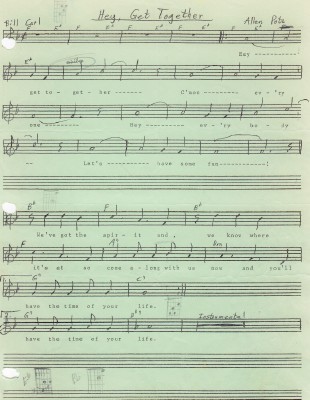 |
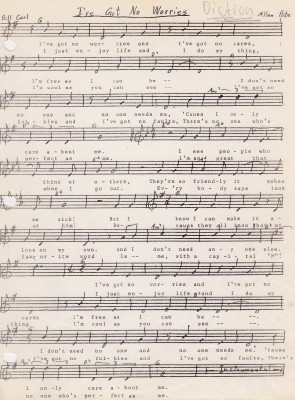 |
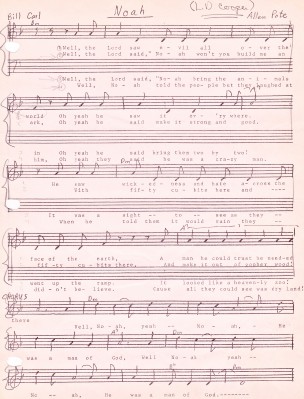 |
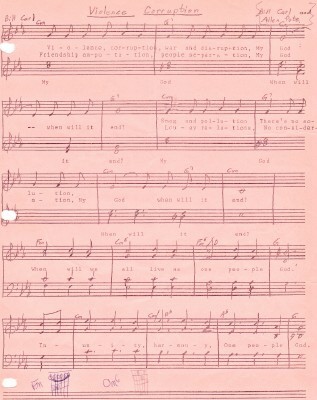 |
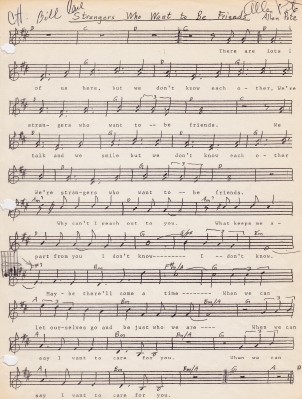 |
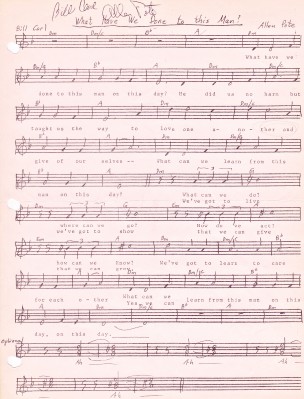 |